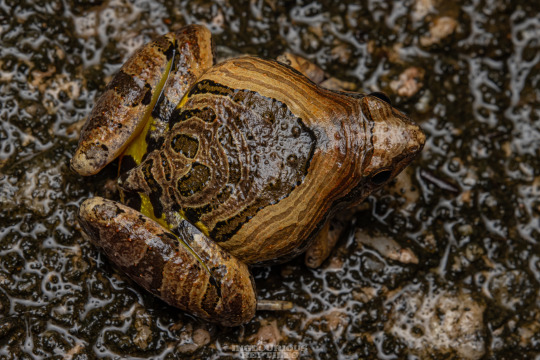#microhyla
Explore tagged Tumblr posts
Text


The phenomenal Microhyla nepenthicola, a species I hoped but did not plan to see during my short trip to Borneo. It’s a pretty small frog. I got the great pleasure of seeing several last night, just outside Kuching!
#frog#animals#amphibians#smol#wildlife#nature#Microhyla#Microhyla nepenthicola#Borneo#apologies for the dirty nail#and the coin you’re probably not familiar with#it was the best I could do at the time
944 notes
·
View notes
Text



Mihintale Narrow-mouthed Frog (Microhyla mihintalei), family Microhylidae, Sri Lanka
photograph by Janith Hasaranga Seram
483 notes
·
View notes
Text
In case anyone was wondering about the origin of the concept of Aquarium Nepenthes.




Bornean Chorus Frog – Life in the Pitcher
The dark, wet rainforests of Borneo provide the perfect habitat for amphibians. The problem for an amphibian fanatic and photographer like me is finding them in these huge, dense jungles. The search becomes even more difficult when the frog that you are looking for is one of the smallest frogs on the planet – The Bornean Chorus Frog (Microhyla nepenthicola), or Bornean Narrow-mouthed Frog. While this species of chorus frog is attractive, if you like that sort of thing, you might wonder why I had a particular interest in seeing it. What is special about a little brown frog? Well, this little brown frog has a secret lifestyle. If you are going to be tiny, soft and potentially a tasty meal for just about everything in the jungle then you had better have some tricks to keep your species alive. Nepenthicola’s trick is its breeding habit. Rather than risking the hazards of the big pond, nepenthicola has learned to utilize the tiny pools that form in a pitcher plant with which it shares its name – Flask-shaped Pitcher Plant (Nepenthes ampullaria)...
Read more: https://incidentalnaturalist.com/2024/11/25/bornean-chorus-frog-life-in-the-pitcher
310 notes
·
View notes
Text

I've been really into Frogs lately.
Right now my favorite frog is the microhyla nepenthicola, which is very tiny and lives in a pitcher plant :) I also love poisonous and carnivorous plants, so it's super fun to me that there's a frog that can live in one !
Sorry, now I'm infodumping about my brainrot.... anyway. Reca totally would, he strikes me as a chronic hyperfixation + special interest haver.
#if any of you call him a 'child version' because he's wearing shorts I will personally hunt you down 😀#drawing assistant director was not nearly as difficult as I thought it'd be. haha. I will draw her more 🥹#mr reca#mr reca fanart#hsr reca#hsr fanart#hsr art#honkai star rail#honkai star rail art#adhd headcanon#autism headcanon#my art#welcome to the peanut gallery ! 🥜
17 notes
·
View notes
Note
hi can you tell me your favorite frogs? i wanna draw some frogs i figured you'd know some fun ones c:
yes!! omg okay so im pretty biased towards frogs from the americas but ill try to put in some variety especially with some funky-looking ones :D
wood frog obviously. theres a variant with a white stripe down their back that some research suggests tends to appear more in grasslands!
spring peepers have a very cute X on their back
grey tree frogs/copes grey tree frogs are also very cute... theyre genetically different but visually indistinguishable
indian bullfrog. this is what the male looks like during breeding season. look at him. hes politely calling you over

spadefoot toads in general but some look especially silly. look at this plains spadefoot. he looks like sad kermit

my favourite sopping wet flat beast (happy flat fuck friday) : the bornean flat-headed frog. hes so flat because he got rid of his lungs :)

the blue-legged mantella and harald maier's mantella. madagascaran frogs that i find very pretty. and boophis pyrrhus bc this website (rightfully) loves boophis. their eyes are my favourite

Proceratophrys laticeps and the ecuador horned tree frog if you want some pointy guys
the manu poison dart frog, blessed poison frog, zimmerman's poison frog.... most frogs in dendrobatidae are brightly coloured or have striking patterns and are GORGEOUS but these are my favourite other than the really well-known ones
Ceuthomantis smaragdinus. there are like two pictures of this species online and im obsessed. look at this

All Calyptocephallelidae (like 5 species). bumpy lads
guangdong frogs (hylarana macrodactyla) AND guangdong rice frogs (microhyla pulchra). completely different families and different looking. thin and pointy vs round triangle. this is the latter

... i think thats it. well obviously there are more but these are the most visually stunning ones i found. i hope it covers a good enough variety of body shapes. there are so many fun species in the world amen
#i speak#i went on a wikipedia hunt for this :D thank you for the excuse#reading this back theyre mostly all so obscure LMAO#but i found some new favourites so. definitely worth it#frogs
8 notes
·
View notes
Text



Beautiful Pygmy Frog (Microhyla pulchra) in Hong Kong, by Artur Tomaszek on iNaturalist
4 notes
·
View notes
Text
Petty ecology ramblings under the cut
One of my fav nature blogs on here recently posted about Microhyla borneensis and Nepenthes ampullaria, which is a species of frog that symbiotically exists with a species of carnivorous plant. Presumably it’s a mutually beneficial relationship, as the frog gets refugia, breeding grounds, a nursery for young, and potential hunting grounds; and the plant gets nitrogen and phosphorous (among other essential nutrients) in the form of fecal/urate deposits.
It’s an incredible relationship that fascinates me, and is actually one of the inspirations for my original thesis on investigating the relationship between a native tree frog and native pitcher plant.
But that blog used a different name for the frog - specifically, a different specific epithet. One that is a huge pet peeve of mine when people use. Generally a species doesn’t get split unless there’s a morphological, behavioral, geographical, or genetic difference between populations. People are arguing that M. borneensis should be split between M. borneensis and M. nepenthicola. But there’s no evidence of geographic isolation, they’re morphologically identical, and before this fad for a “new” species came about a 2018 study conducted DNA analysis to revise the genus. The study found that M. borneensis has one of the lowest mean % p-distances in mitochondrial DNA for the clade it was grouped in, and is in the lower percentile for the above when looking at the genus as a whole. Meaning there’s no evidence to support enough genetic variability within the species to split on the basis of DNA. Granted, there’s a chance they didn’t collect DNA from any of the so-called M. nepenthicola, but they selected 15 individuals across multiple sites - it’s hard to believe they didn’t get DNA from one of those individuals. That should be a sufficient sample size. Hell, even the paper that was published in 2010 that claims the new name for this “species” found less genetic difference (when using Bayesian Inference Analysis) between an individual M. borneensis and M. nepenthicola when comparing two M. nepenthicola individuals to each other. The science in the original claim contradicts itself!!!
The only reason people are claiming it should be its own species is because they claim they’re behaviorally different from M. borneensis, with M. nepenthicola exclusively selecting pitcher plants as their egg deposition sites, and M. borneensis selecting everywhere except pitcher plants. That makes no sense. They argue the species are cryptic and have the exact same geographic range. That’s so fucking stupid. All that’s happening is that there’s variability in individual choice for egg deposition sites within the species.
It makes no sense for there to be two species that are morphologically and genetically identical, have the exact same geographic range, but one species selects one nursery site and another selects every other nursery site. It’s lazy and just another example of bad science within the carnivorous plant community (everyone wants to name a species soooooo badly, it’s ridiculous. I could rant about an example from this year, but that’s a whole other post). The ICZN doesn’t recognize this “new” species for good reason, and it drives me bonkers how many scientists continue to use this name despite being repeatedly shown to not be accurate.
#runon post#I might make an educational post on my ecology blog#I keep meaning to use that but am lazy and end up blogging everything here
0 notes
Photo

Microhyla borneensis by peter soltys
#Anura#Microhylidae#Microhyla#Microhyla borneensis#frog#frogs#animal#animals#biology#nature#wildlife#amphibian#amphibians#zoology#herpetology#herps#fauna#critter#critters
65 notes
·
View notes
Text

today's funky frog of the day: the Mangaluru narrow-mouthed frog (Microhyla kodial)!!!!!! these froggy friends were only described recently in 2018! they live in india.
photo by Harshith J. V.
616 notes
·
View notes
Text
frog of the day :)
Microhyla pulchra, Common names: Marbled pygmy frog, beautiful pygmy frog, Guangdong rice frog

(image source)
Habitat: Lives on the forest floor of open and non-dense forests, and rocky areas of which it can camouflage well with.
Found in: China and India

(image source)
#Microhyla pulchra#frog of the day#Genus: Microhyla#FAMILY: Microhylidae (narrow mouthed frogs)#narrow mouthed frogs
31 notes
·
View notes
Note
Whas ur favorite frog
Today's favourite frog is Microhyla berdmorei, which looks like it skipped arm day, but hit leg day extra hard.

[src]
#frog#frogs#animals#wildlife#nature#Microhyla#Microhyla berdmorei#leg day#big thighs#legs for days#oh lawd he comin#this frog looks like it is wearing the wrong size legs#they could be half as big and it would look totally normal#whose idea was this#I really want to know how on earth this thing lands#because you can imagine that those kickers can launch it for METRES#I bet it fully faceplants#many frogs do#forgleto-o#answers by Mark#anyone who asks me what my favourite frog is is going to get a different answer than the last person#sorry I don't make the rules
816 notes
·
View notes
Photo



DAMN GIRL … SHE THICC 😤😖😩😭
#nice#dem legs#frog#frogs#narrow-mouthed frog#microhyla pulchra#красивая узкоротая квакша#красивый азиатский узкорот#thick#shitpost#nature#animals#frogs n toads
7 notes
·
View notes
Photo



The aptly-named beautiful pygmy frog [Microhyla pulchra] is a small species native to northern India, southern China, and southeast Asia. These frogs are rarely seen due to their seasonal habits and excellent camouflage. Images by Artur Tomaszek.
3K notes
·
View notes
Text

Frogs? Amphibians? What’s the Fuss?
I have always loved frogs, ever since I was a little boy.
I still haven’t put my finger on what exactly mesmerises me so much. Is it their slippery skin, their hopping legs and huge eyes? Is it their diversity, the number of different body shapes and colours they exhibit? Is it that they have semi-permiable skin by which they absorb oxygen, that some lay eggs that are translucent so you can see the young develop? Is it that some frogs carry their tadpoles/froglets on their back or even in their mouths? Is it that they undergo a dramatic metamorphosis from tadpole to frog? Is it that they are found on every continent except Antarctica, and that amphibians have existed on Earth for over 300 million years? Or, is it that nearly 168 species are believed to have gone extinct in the last two decades and more than 43% of the world’s amphibian species are in decline?
It is all these things and more.
I believe frogs to be particularly worthy of our interest and conservation, especially due to the worrying global amphibian population declines that appear to be one of the most severe examples of the Holocene extinction. The unprecedented loss of amphibians will have severe implications for global biodiversity.
Finding Frogs in Borneo
During our recent visit to Danau Girang Field Centre in Borneo, I was desperate to get out at night and photograph as many frogs as possible. Walking up and down the track from the jetty to the Centre we saw many species. We also managed to join Juan (a researcher at the Centre) and a few local guides during their field work which gave me more time to search. The following are some of the species we encountered.
Species Encountered
Family: Dicroglossidae

Fejervarya limnocharis [ASIAN GRASS FROG]

Limnonectes finchi [ROUGH GUARDIAN FROG] with tadpoles
Family: Microhylidae

Metaphrynella sundana [BORNEAN TREE-HOLE FROG]

Microhyla borneensis [MATANG NARROW-MOUTHED FROG]
Family: Ranidae

Chalcorana chalconota [WHITE-LIPPED FROG]

Hylarana glandulosa [ROUGH-SIDED FROG]
Family: Rhacophoridae

Kurixalus appendiculatus [FRILLED-TREE FROG]

Polypedates colletti [COLLETT’S TREE FROG]

Polypedates leucomystax [FOUR-LINED TREE FROG]

Polypedates macrotis [DARK-EARED TREE FROG]
To see larger versions of the above photos, click on the thumbnails below.
Limnonectes finchi [ROUGH GUARDIAN FROG] with tadpoles
Chalcorana chalconota [WHITE-LIPPED FROG]
Polypedates colletti [COLLETT’S TREE FROG]
Kurixalus appendiculatus [FRILLED-TREE FROG]
Microhyla borneensis [MATANG NARROW-MOUTHED FROG]
Polypedates leucomystax [FOUR-LINED TREE FROG]
Fejervarya limnocharis [ASIAN GRASS FROG]
Metaphrynella sundana [BORNEAN TREE-HOLE FROG]
Hylarana glandulosa [ROUGH-SIDED FROG]
Polypedates macrotis [DARK-EARED TREE FROG]
Although we managed to see a good number of species, there were many more we didn’t come across. I guess you can’t see everything you want at once. The only remedy is a return visit and more time exploring the forest. Well then, until next time!
Polypedates colletti [COLLETT’S TREE FROG]
Want to Read More?
If you’d like to read more about our trip to Borneo and the wildlife we encountered there, check out some of our other blog posts here:


References and Further Reading
Amphibia Website – https://amphibiaweb.org/declines/declines.html (Retrieved 8 November, 2017)
IUCN Red List Website, Asian Grass Frog – http://www.iucnredlist.org/details/58275/0 (Retrieved 8 November, 2017)
IUCN Red List Website, Bornean Tree-hole Frog – http://www.iucnredlist.org/details/57872/0 (Retrieved 8 November, 2017)
IUCN Red List Website, Collett’s Tree Frog – http://www.iucnredlist.org/details/58942/0 (Retrieved 8 November, 2017)
IUCN Red List Website, Dark-eared Tree Frog – http://www.iucnredlist.org/details/58955/0 (Retrieved 8 November, 2017)
IUCN Red List Website, Four-lined Tree Frog – http://www.iucnredlist.org/details/58953/0(Retrieved 8 November, 2017)
IUCN Red list Website, Frilled tree frog – http://www.iucnredlist.org/details/58972/0(Retrieved 8 November, 2017)
IUCN Red List Website, Matang Narrow Mouthed Frog – http://www.iucnredlist.org/details/57877/0 (Retrieved 8 November, 2017)
IUCN Red List Website, Rough Guardian Frog – http://www.iucnredlist.org/details/58333/0 (Retrieved 8 November, 2017)
IUCN Red List Website, Rough-sided Frog – http://www.iucnredlist.org/details/58603/0 (Retrieved 8 November, 2017)
IUCN Red List Website, White-lipped Frog – http://www.iucnredlist.org/details/58568/0 (Retrieved 8 November, 2017)
Wikipedia Website, Decline in Amphibian Populations – https://en.wikipedia.org/wiki/Decline_in_amphibian_populations (Retrieved 8 November, 2017)
A few #forest #frogs from our adventures in #Borneo. 🐸🐸🐸 #Kinabatangan #Sabah #Malaysia Frogs? Amphibians? What's the Fuss? I have always loved frogs, ever since I was a little boy.
#Borneo#Chalcorana chalconota#Danau Girang Field Centre#Fejervarya limnocharis#Frog#Herpetology#Hylarana glandulosa#Kinabatangan#Kurixalus appendiculatus#Limnonectes finchi#Metaphrynella sundana#Microhyla borneensis#Polypedates colletti#Polypedates leucomystax#Polypedates macrotis
1 note
·
View note
Photo

ヒメアマガエル Microhyla okinavensis 幼生 (2020.07.26)
3 notes
·
View notes
Photo

Microhyla sp. - need ID https://ift.tt/2YJb2xq - Follow me https://ift.tt/Roy1qi
1 note
·
View note